Parliament this evening approved several motions which will change procedures adopted in the House of Representatives. The motions will change the standing orders permanently on matters on which the two sides of the House have an agreement.
The amendments proposed by the government were passed unanimously while those presented by the Opposition were not approved by the House. The Opposition's amendments included one for the introduction of the Prime Minister's question time, which however was rejected by the government side.
The changes were explained by the Prime Minister as he was speaking in Parliament this evening in a debate the two sides have been discussing for three years.
Dr Muscat said that it was always the government's intention to find the widest agreement possible over this matter. But now it is time to move forward and decide. The government, he said, had separated the motions in order for Parliament to move on - and this is why one motion deals with permanent changes and the other for matters that will end when Parliament is dissolved. If, in this period, an agreement is reached for temporary measures to be made permanent, the government will have no objection to included any future agreement in the standing orders on a permanent basis.
He told Parliament that it is not the first time that the government reached an agreement with the Opposition on changes in standing orders. Dr Muscat said both sides agree that MPs who do not attend parliament without a justifiable reason, have to face a fine. There was also an agreement to set up a Committee for Petitions.
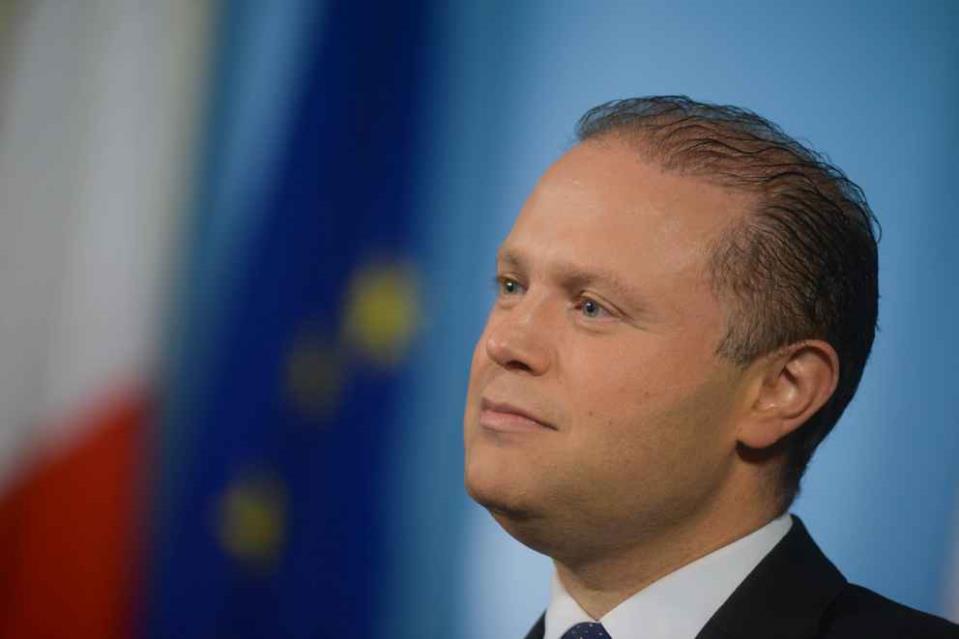
Dr Muscat said this government is changing the policy by which a minister cannot sit on parliamentary committees that are discussing matters pertaining to that particular portfolio because of "obvious conflict of interest". Under the previous administration, a Minister was in a position to question people who worked in departments that fell under his or her responsibility; from now onwards it will no longer be so.
He said that all of the MPs are requested to attend parliamentary sessions, and no one is excluded except when MPs are abroad on government or parliamentary work, or when they are indisposed. "Simon Busuttil is saying that the government MPs should not attend EU Council meetings. He called me Farage once, but not even Farage comes up with something like this." Dr Muscat said that the Leader of the Opposition has no idea on what is he talking about.
Speaking earlier, Opposition Leader Simon Busuttil asked why Joseph Muscat was afraid of facing questions in Parliament, making reference to the government’s seeming reluctance of the idea for Prime Minister Question time to be introduced.
“Why is he fearing our questions? Something so simple, that goes towards political responsibility and transparency. What is the real reason he doesn’t want to accept this basic proposal?” he asked.
Dr Busuttil appealed to the Prime Minister, who he said was not present, to put off today’s vote which will see the standing orders changed, and continue discussing to find agreement rather than vote on two motions tonight.
“We are close to an agreement when it comes to changing the way this House works, but there are a number of issues where, although we are not far from agreement, government continues to refuse putting the vote off”.
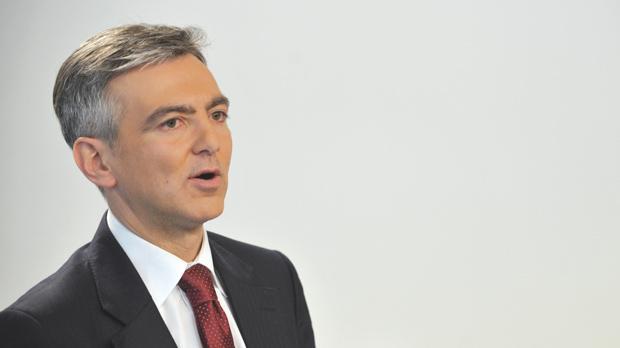
“This debate is a strong reflection, precisely of how government treats Parliament, given Parliament is the highest institution. Does government treat it with dignity, or come here not interested in finding agreement with anyone over anything. This is government’s first test of this type”.
Dr Busuttil spoke of votes being taken once a week, and said this would make it a "once a week Parliament".
Dr Busuttil said he agreed with fines for MPs who do not attend Parliament, yet could not understand why votes will only be on a Wednesday. “Ministers will be exempt from the fine, and so it doesn’t apply for them. The amendment means that when Ministers are abroad they are exempt. They are abroad often. So on one side we have a fine for MPs, and on the other when a quorum is called, more time will be given for government to gather its members. Isn’t this government laughing in the peoples faces?”.
Home Affairs Minister Carmelo Abela, interrupting, said that ministers are not exempt from paying the fine if they do not attend. “There are reasons where one could be excused, which apply for everyone”.
Dr Busuttil said that one of the reasons for not attending is if a Minister is abroad on government business. "Your primary job is to be present in the highest institution of the country. Let's introduce the fine, we are even ready to accept ministers being exempt, but don’t come here and make voting applicable only on a single day, or extend the amount of time given during a quorum call”, he said.

Dr Busuttil turned his attention to public entities. “Government is not respecting Parliament as the highest institution. Government has hijacked public entities, placed its own people inside them and instead of serving the people, they are serving government”. He said that the Ombudsman and the Auditor General are some of the only Public entities that are free, yet government attacks them ferociously.
“The Auditor General was the centre of a fascist attack by a PL MP, so much so that the Auditor General had to write to Parliament to explain that he moved according to the book and that his employees did their job. For Dr Muscat it is not wrong for PL MP to attack the independence of the Auditor General”.
“A weak Auditor General, and a weak Ombudsman, means a weak citizen. When we are defending these institutions, like Parliamentary powers, we are defending citizens and giving citizen’s a voice”.
The PN, he said, have presented no less than 40 motions this legislature. “This shows the Opposition is effective and is working, coming out with its own ideas. But if these motions are not placed on the agenda, then it is for nothing, this is why the Opposition needs time to put forward their agenda in Parliament”.

Turning to the Police Force, he criticised government for not having a police chief for the past three months. “It’s obvious why, as they don’t want Keith Schembri and Konrad Mizzi investigated over the Panama Papers scandal”.
“People today are awaiting a signal from government, to see what kind of government it is, how government acts with others. Today there is a test.
He said that the PN will vote in favour of the PN proposals, but against the government amendments to those which were originally presented. "If both sides go back to the negotiating table, we could reach agreement, we weren't far off. Let us agree on the Standing Orders, and don't keep trying to steamroll everyone".
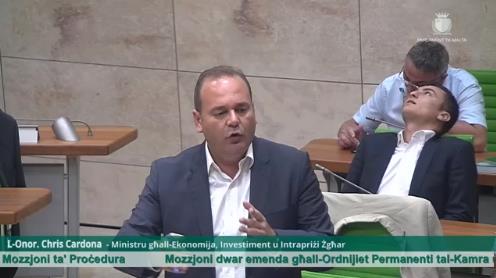
Labour Party Deputy Leader, Dr Chris Cardona said that the aim of these two separate motions is to make things similar and more efficient in the country's highest institutions - Parliament. He lambasted Simon Busuttil for saying that Ministers should miss EU Council meetings so as not to miss Parliamentary sessions.
"These motions will set the bar higher for us and the future generations," he added.
At the start of the sitting, PN Deputy Leader Mario de Marco questioned how changes proposed by government to standing orders will result in a more efficient parliament and giving citizens a stronger voice.
Dr de Marco argued that Deputy Prime Minister Louis Grech said that the changes proposed by government would help improve the Parliamentary proceedings by making it more efficient and help give a stronger voice to citizens. "One amendment would see the time for checking if there is a quorum increased from five to fifteen minutes. Will this make Parliament more efficient?" he asked.
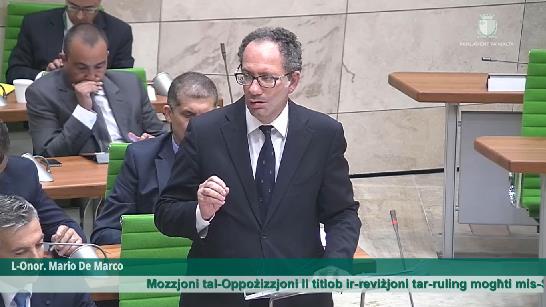
The PN Deputy Leader said that another proposal sees the maximum time MPs will be given to speak will be reduced from 40 minutes to 30 minutes. "In all seriousness, will we strengthen the voice of citizens by reducing the voice of MPs? Is it logical for government to say they are giving a stronger voice to citizens when they are reducing the time MPs have to discuss in Parliament? Will these ten minutes make a difference to efficiency? This is just a cosmetic change and not one that will make Parliament more efficient".
The only amendment that will strengthen the voice of citizens is the introduction of a Parliamentary petitions committee, he said.
As for the Thursday sitting, that alternates between government and the opposition, he explained that through the amendment government is saying it can be used once every three months. "When reducing the three months of Summer, Easter and Christmas, this means it can be used three times".
He spoke of a number of PN proposed amendments. "Firstly, we suggest that the Thursday sitting should be one week for government, and the following for the opposition, and that if one side misses that opportunity, that right be lost for that week". Dr de Marco said there are a large number of bills put forward by the Opposition, pending since 2014, however the PN cannot debate them as government has kept in possession of the Thursday sitting.

Tourism Minister Edward Zammit Lewis spoke of the growing volumes of legislation.
The time taken up by discussions is increasing, he said, and spoke of the need to dedicate time to questions civil society wants Parliament to discuss, which are separate from laws. I heard my colleague Mario de Marco, ask how these amendments will improve efficiency, etc. You cannot take the amendments without looking at what we have done recently. We are building a robust framework that addresses more autonomy for this Parliament. It gives voice the citizens and brings in more efficiency in the way things occur. You cannot take one aspect of what we have done, with Parliamentary services bills and standard in public life bill etc, alone. Putting all these together, yes, it makes an important difference.
He mentioned that the majority of ministerial statements have not taken longer than 15 minutes this legislature, he said.
The Minister spoke about the new standing order proposals that would not allow a minister to remain on a Parliamentary Committee which deals with his sector, adding that this would remove the possibility of a conflict of interest.
Speaking about the Prime Minister’s Question Time, he said the PN are trying to introduce a system which is used in the UK. “The Prime Minister is under daily scrutiny already, and three days a week, questions are made to the Prime Minister who comes here and answers. Procedurally in the UK Parliament, it is not only the Prime Minister that answers. The Opposition Leader there also answers questions”.
“I cannot understand how the Opposition did not agree with the alternating Thursdays. Today, there is nothing in the regulations about this, it is currently just practiced. We are now improving this. He said that PL backbenchers might very well want to put something forward. “Your proposal is not fair, they might have their own initiatives to present, their own agenda”.
“We want the opposition to be more active, and there is the Consideration of Bills Commtttee where in general, the agenda is agreed upon”.
Turning back to the reduction in MP debate time, he said that it would improve efficiency and stop MPs wasting time. “Even a spectator’s attention span, it’s around 10 minutes”.

PN MP Francis Zammit Dimech spoke about the differed decision, where votes will be taken the following Wednesday, or the one after that. That is not acceptable, he said.
He mentioned that motions of procedure are limited, rather than permanent. We try and bring agreement to standing orders, given that they are more permanent. He said that where there isn’t agreement on the standing orders, those motions should be moved to the procedure motion, so that there would be agreement on the standing orders, and then MPs will vote separately on the Procedure motion.
He spoke about the difference of government Ministers and backbenchers who hold a government role, and the Opposition. He said that the majority of those on the government side have help when it comes to researching for Parliament etc, whereas those on the Opposition must take time out of their other jobs etc., to research topics and prepare for Parliament.
“In the future, we should present motions to include help for research etc, thereby strengthening the roles of MPs”.
Describing the Prime Minister's Question time proposal, he said that the Prime Minister is already calculating the kind of questions the Opposition would ask and is avoiding that situation. "In the UK, the Prime Minister needs to answer every question, no matter how hot the topic. If Dr Muscat is not afraid of this, then he should agree to this amendment".
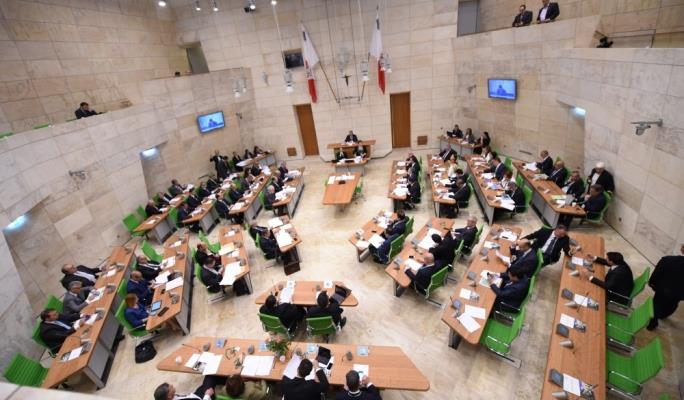
Government Whip, Godfrey Farrugia called for an exam of conscience by his fellow MPs so that Parliament hosts constructive dialogue. He also called on Parliament to update its statute. "Even a local band club updates its statute, but this institution seems to be stuck in time", he added.
"I want Parliament to have an administrative proves that is more efficient and MPs more responsible. But we also need to be more family friendly."
"We must also be generous with ourselves and need to take care of our wellbeing. Parliament is meeting outside office hours ignoring the fact that there are young parents who are being stuck inside this chamber instead of spending time with their loved ones."
Parliament held a moment of silence earlier, after the incident in Munich last week where a teenager took a gun and fired shots killing a number of innocents, and where a bombing left 80 dead in Kabul.
In Munich, the shooter, an 18-year-old German-Iranian, visited the site of a previous school shooting in the German town of Winnenden and took photographs last year, then set about planning Friday's attack in which he killed nine people and wounded some three dozen others before taking his own life.
Europe has seen a multitude of attacks over the past weeks, which also included a bombing, where a 27-year-old Syrian blew himself up after being turned away from an open-air music festival.